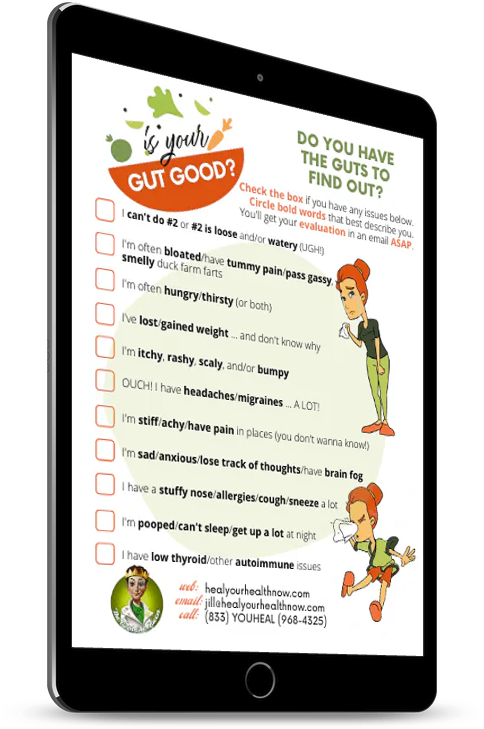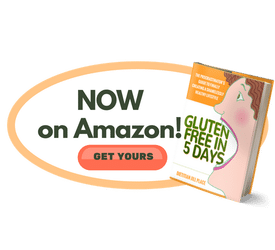 By Dietitian Jill Place
By Dietitian Jill Place
I’m gonna name the pink suede elephant in the room right away … it’s very difficult to recommend supplements for a good gut for every body. But lots of times … even if you make the great diet changes we’ve been talking about … you need them.
You need them to heal the ravages of the inflammation resulting from having a leaky gut … sometimes since you were an infant. But the extent of the damage … and what particular nutrients you need for healing … depends upon so many things.
Nutrient deficiencies are one thing. The gut AKA small intestine is the seat of nutrient absorption. Thiamine, folate, biotin, riboflavin, and panthothenic acid are synthesized by gut bacteria. And up to half of the daily Vitamin K requirement is also.
So … if your gut is leaking, inflamed, and overwhelmed with “Bad Gut Guys” … this ain’t happening … for starters. Also … [click_to_tweet tweet=”if you take antibiotics … and most of us do … studies have shown that it may take a few weeks to UP TO SIX MONTHS TO REPOPULATE YOUR MICROBIOME.” quote=”if you take antibiotics … and most of us do … studies have shown that it may take a few weeks to UP TO SIX MONTHS TO REPOPULATE YOUR MICROBIOME.” theme=”style2″]
Other studies have linked the use of antibiotics in children to an increased lifetime risk of asthma, obesity and inflammatory bowel disease … effects thought to be mediated by the gut microbiome.
But … there ARE basic supplements that are universally gut-healing. I’ve put them all in a Fullscript Gut-Relief Protocol on my dispensary. You can get them there by clicking the name.
I just want you to know right away … however …. that this protocol is GENERAL. Each person has individual needs.
I test for those … again … individually. But these are a GREAT start for just about everyone …
Glutamine
I introduced Glutamine into my integrated cancer clinic. We used it for everyone who was going through chemo and radiation.
There was tons of research at that time that it protected the gut. From the overwhelming damage chemo and radiation bring.
When I left … the doctor who did all the chemo research included it as part of his next research protocol. It was that effective.
And the rock-base of this protocol. There is tons of evidence that it is the essential dietary supplement to help maintain gut integrity, tight junctions (the “coffee filters” between gut cells that filter good nutrients into the bloodstream and block other “Bad Gut Guys” … toxins, molds, and other heinous things) and barrier function.
The gut can’t make Glutamine and relies on other tissues and the diet to supply it. Clinical trials have shown significant benefit by reducing the rate of death and length of hospital stay as well as improving patient outcomes in critical illness, surgical stress and cancer.
Second, Glutamine boosts glutathione, a protein that’s important for maintaining cell health and preventing oxidative stress. Therefore, Glutamine acts as an antioxidant in a way.
Third, Glutamine may slow weight loss and muscle wasting, and therefore encourages weight gain and muscle mass; it is often found in bodybuilding supplements. Fourth, it may help with depression, anxiety, and insomnia.
Lastly, Glutamine feeds and protects normal, intestinal, and immune cells but prevents cancer cells from growing if cancer is a possibility or if there is a family history.
Taking Glutamine
Research studies show that you need to take 30 grams or more of Glutamine at first for best gut-healing results. And then reduce the dose to 5 to 10 grams a day over time.
To that end, it’s best to take a pure pharmaceutical powdered form of Glutamine. This type is only available through your practitioner. And it’s much less expensive in bulk.
Some tips about taking … Glutamine loses potency when it’s mixed ahead of time, so the best way to take it is to mix it with a liquid or moist food. And eat or drink it within 30 minutes of mixing.
The powder is odorless and tasteless so it won’t spoil the flavor of foods. The only noticeable difference is that food or fluid may be slightly thickened with use. Which is great for those thick smoothies.
Digestive Enzymes
Most of the time our bodies produce enough enzymes on their own to handle the foods that we eat. But when you have a leaky gut your digestive system usually doesn’t make enough of them.
So it just makes sense to help it along. Taking enzymes kick-starts digestion … making food easier to break down and absorb.
Enzymes can go a long way toward diminishing digestive issues such as gas, bloating, diarrhea, and constipation. And women’s problems such as PMS or hot flashes diminish once their bodies can break down sugar correctly.
Also … our digestive tract is covered with these “little fingers” called villi where nutrients are absorbed. When you have a leaky gut, these villi are “blunted” or sheared off … making digestion challenging.
Villi are covered with vital digestive enzymes. So no villi … no enzymes. Therefore … supplementing with enzymes is crucial for healing and rebuilding villi.
In most cases, the villi rebound over the course of a few weeks. But … again … everyone is different and taking enzymes on a regular basis might be a good idea.
Taking Enzymes
I always recommend that people take a broad-spectrum digestive enzyme that contains proteases (for protein), amylases (for carbohydrate) and lipases (for fat). Vegetarians may prefer plant-based enzymes.
And be careful if you have common pineapple and papaya food allergies as many enzyme blends have them. In the forms of bromelain and papain respectively
Take one or two capsules with meals three times a day to begin; don’t worry if it’s before, during or after. I fill these super-small zip-closed bags I bought on Amazon and put them in a container in my purse (and a custard cup on my kitchen counter) for easy dosing.
You may diminish this amount over time as you watch symptoms improve. Experiment!
Betaine
Antacid use is a multi-BILLLION-dollar business. In one survey, 51.3% reported taking antacids at least once in the previous six months and 10.9% took antacids daily.
Other research has reported a 25% increase during the pandemic. Use increased so much that antacids were hard to find at one time.
Pandemic over-users failed to realize however that stomach upset at that time was most likely due to other things … like stress. Also … the whole idea that stomach upset is due to an OVERABUNDANCE of stomach acid is wrong too.
I once gave a talk about the fact that digestive issues were instead due an UNDER-ABUNDANCE of stomach acid at a marketing breakfast. After I finished, a whole bunch surrounded me and hailed me as some sort of good-gut messiah … they understood the concept immediately!
Here’s what I said. That you need enough stomach acid to signal the sphincter muscle at the bottom of the stomach to open … and dump its contents into the gut. Not enough stomach acid … the food stays in the stomach and ferments … causing all kinds of distress.
That’s a very simple way of explaining it and … as always … what the human body does is a lot more complicated. But you get the point.
In other words, [click_to_tweet tweet=”most of us need MORE stomach acid … not less. Using antacids might relieve the pain. But not the problem.” quote=”most of us need MORE stomach acid … not less. Using antacids might relieve the pain. But not the problem.” theme=”style2″]
Betaine is hydrochloric acid … the stuff in our stomach. So it just makes more sense to use it to aid digestion than an antacid.
Taking Betaine
I always recommend that you start with one tablet per meal … and then increase one per meal until you have an “acidy” (some call it warm) feeling. Then back off one tablet and that’s your per-meal dose.
Betaine is often paired with pepsin, a protein enzyme. This form of pepsin assists protein digestion by activating pepsinogen to pepsin … the active form of the enzyme.
Pepsin also protects the stomach against ingested pathogens as well as preventing overgrowth in the small intestine. It also promotes bile and pancreatic enzyme flow … the substances that digest fat.
Probiotics
[click_to_tweet tweet=”Forget what every ad and promotion tells you about probiotics. The truth is that NOT EVERYONE SHOULD TAKE THEM!” quote=”Forget what every ad and promotion tells you about probiotics. The truth is that NOT EVERYONE SHOULD TAKE THEM!” theme=”style2″]
Again … the body is not that simple. You can’t just take one supplement and heal your gut. Also, if you have conditions such as candida overgrowth or SIBO (small intestinal bacterial overgrowth) … probiotics are downright contraindicated.
If you have these overgrowths, it doesn’t make sense to add MORE bacteria to a place that’s already over-run with them. You instead need to bring down the “Bad Gut Guy” population before you add more “Good Gut Guys” to restore balance to your microbiome.
But that’s more advanced treatment. And I don’t even think about it before I test the condition of the microbiome.
For general probiotic use, wait at least a couple of weeks or maybe a month before beginning any probiotic. And then do so slowly. Because using them may cause more digestive upset.
Personally, I prefer to use a combination of probiotics … especially soil-based spore-forming ones. Research suggests that having a wide array of different types of microbes in our gut makes our microbiome more capable and resilient.
Dr. Josh Axe wrote a book awhile ago called “Eat Dirt”. In it, he advocated that our increasingly sterile environment … made even more so by the pandemic … deprives us of these organisms that are vital for our very survival.
Soil-based probiotics themselves are hardier and more able to survive the tempests and markedly diverse climates of your digestive system. And arrive in the gut ready to propogate. They also don’t need to be refrigerated.
Accepted … well-researched forms of soil-based probiotics include Bacillus coagulans, Bacillus subtilis, and Bacillus clausii. Be wary of those who aren’t … do your homework.
But … if you’re looking for diversity … it’s also a good idea to use probiotics we all know … like lactobacillus and bifidum bacteria strains. The more the merrier!
Taking Probiotics
Again … I like to alternate soil-based probiotics with regular ones. You can alternate them by day, week, or every two weeks. Whatever feels good to you.
And discontinue use if you’re experiencing any discomfort … your gut may not be healed enough to be repopulated. Put those probiotics on the shelf or in the fridge … you’ll use them eventually. And continue your Good Gut diet and gut-healing supplements.
If you ARE OK with probiotics, don’t forget to get some of the accepted strains listed above. Also … for now … steer clear of those with prebiotics like FOS (fructooligosaccharides) and inulin.
I recommend that the best regular probiotics be refrigerated; you don’t have to refrigerate soil-based probiotics. Or one of the ones I recommend in my Fullscript Gut-Relief Protocol. If you’re not sure about storage, follow the directions on the bottle.
Look for the ones that have at least 5 billion CFUs (colony-forming units). Many have more. And … again … these better types of probiotics are usually only available from practitioners. DON’T buy anything that’s not well-recommended by people who know how to use supplements for your greater good,
Other Supplements for a Good Gut
Of course … experts disagree about what works best for gut-healing. Many recommend collagen and bone broth … those are good for some.
Many also recommend fish oils, Quercetin, CoenzymeQ-10, and N-acetylglucosamine. Those are good too.
A favorite personal supplement … too … is Deglycyrrhizinated licorice root (DGL). This supplement not only helps to keep our stomach’s mucosal lining thriving, but also balances hormones and prevents adrenal fatigue.
But I don’t consider DGL basic for gut-healing … it IS however an option that you might consider. Especially as an antacid substitute.
[click_to_tweet tweet=”Other experts also recommend antifungals. But please … PLEASE don’t go there unless you’re tested for bacterial overgrowth.” quote=”Other experts also recommend antifungals. But please … PLEASE don’t go there unless you’re tested for bacterial overgrowth.” theme=”style2″]
As different issues require different treatments. In conclusion, I wouldn’t recommend any supplements past the few basic ones in my protocol (and maybe DGL) WITHOUT diagnostic tests. You may be … at the very least … taking the wrong ones. And … at most … harming yourself.
Millions of Americans today are taking dietary supplements, practicing yoga and integrating other natural therapies into their lives. These are all preventive measures that will keep them out of the doctor’s office and drive down the costs of treating serious problems like heart disease and diabetes. ~ Andrew Weil


Leave a Reply